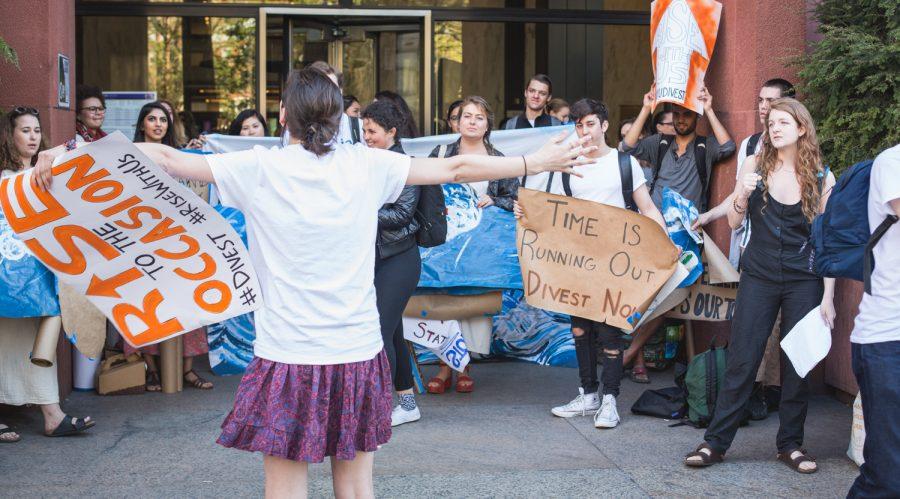Divestment: More Controversial Than You’d Think
April 29, 2016
NYU Divest and its allies have made progress in recent weeks by securing a meeting with the Board of Trustees’ Investment Committee following a 33-hour sit-in at Bobst Library. While the organization has made some headway furthering their stance that the university should divest its investments from the fossil fuel industry, a voice opposing the movement has emerged amongst the NYU community.
Last year, the University Senate passed a resolution in favor of divestment and former NYU President John Sexton promised Divest organizers a meeting with NYU’s Board of Trustees.
However, before the University Senate resolution was passed, there was already controversy surrounding the issue. The University Senate assigned the issue of divestment to the Senate Financial Affairs Committee, which then formed a subcommittee to produce a report on the financial and environmental impact of divestment, called the Divestment Working Group. The Divestment Working Group ultimately produced a report opposing divestment.
The nine-member committee was created in order to examine whether the university’s divestment would make a difference in the overall predicament of climate change. Their report stated complete divestment would be more of a political action and statement than impactful change for the fossil fuel industry.
In addition, the group suggested that the university should foster sustainability through direct action practices make a positive environmental impact such as teaching and spreading awareness.
“[T]he working group has concluded that supporting divestment is primarily a political action or statement that expresses the university’s opposition to the fossil fuel industry’s role in global warming or climate change – and there is not sufficient justification for such an action or for enactment of a policy of the university,” the report reads. “However, the working group is unanimous in its support for continuing direct action by NYU to reduce carbon emissions, improve sustainability, and reduce dependence on fossil fuels.”
Students like CAS sophomore Michael Anastasiou are also concerned with the possible financial implications divestment may have on the university, such as a potential increase in tuition.
“For an institution that praises itself with investing in its students future, generating as much revenue as possible through investments is imperative for maintaining a much needed positive cash flow,” Anastasiou said.
Divesting from fossil fuels could decrease the university’s endowment, which concerns some students in the NYU community.
“With tuition costs in this institution at historically high levels, a four year degree is not attainable for the average income earner,” Anastasiou said.
SPS junior Eli Nachmany voiced his concerns surrounding divestment in the New York Times last May, suggesting that divestment would not actually hurt fossil fuel companies but would only hurt NYU. In a study released in 2015, California Institute of Technology professor Bradford Cornell estimated that divestment would cost NYU $4.16 million per year.
“I find it most interesting that the same individuals advocating for divestment are the same fighting for affordability and economic justice at NYU,” Nachmany said. “Instead of dedicating time and effort toward tangible green programs and the development of sustainable modules, the group wants to make symbolic statements.”
In addition, Nachmany reiterated Anastasiou’s tuition concerns saying that divestment might impede the university’s ability to provide financial aid and scholarship to the students who need it.
“The way forward is not through symbolism, but through substantive change, which divestment would not achieve. There is no direct path between divesting and solving climate change,” Nachmany said.
Email Ludovica Grieco at [email protected].
UPDATE: This article has been updated to include the following statement from CAS junior Olivia Rich on behalf of NYU Divest.
“Many financial experts, including the Bank of England, have warned that fossil fuels companies are a risky investment,” Rich said. “Bradford Cornell’s study is contradicted by other research, including a study done by the Aperio group, and is based on performance of companies in the last 20 years, which is not a good predictor of the future given the likelihood of government action against fossil fuel extraction. Significant consensus exists in the NYU community that divesting from fossil fuels is consistent with NYU’s values and mission. Over 80% of the University Senate supported a pro-divestment resolution, rejecting the Working Group Report. The case for divestment is strong and is widely supported at NYU.”



























































































































































